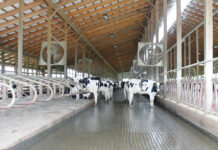LEXINGTON, Ky. — Are there bad guys that could be good guys? In Mother Nature’s circle of life, maybe.
University of Kentucky doctoral student Katelyn Kowles and her adviser, entomologist James Harwood, are in the first year of a study to examine the structure of food webs in winter wheat, focusing on predators that feed on a variety of pest species.
Predatory insects
The ultimate goal of the agriculture researchers is to determine effective ways to use predatory insects and spiders to suppress pest populations in conservation biological control.
“As we try to build sustainable crop systems, understanding predator/prey relationships is crucial,” Harwood said.
Their study focuses on major pests of Kentucky wheat such as slugs and a variety of aphid species, including English grain aphids and bird cherry-oat aphids.
Viruses
These aphids are carriers of the barley yellow dwarf virus, the most widespread and destructive virus of wheat. On average, the virus causes an estimated 17 percent loss of the world’s crop each year. In Kentucky, the severity of damage from the virus varies annually with some years having trace amounts and others being epidemics.
Epidemic years can result in economic losses in the millions of dollars.
“If we can knock out low populations of these insects early in the season using natural predators for biological control, we can minimize yield losses,” Harwood said. “Hopefully our research will generate sufficient data to aid growers and commodity groups to make sound, sustainable management decisions.”
Gut analysis
Harwood’s and Kowles’ study determines predator/prey relationships through a process called gut content analysis, in which researchers are able to obtain and analyze DNA of prey from a predator’s digestive tract.
With this data, not only can they identify predators and prey, but they can determine predators’ foraging preferences and how an abundance or limited number of prey alters the structure of the food web.









